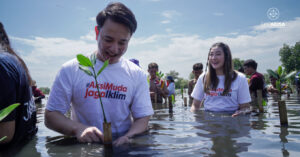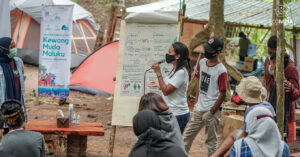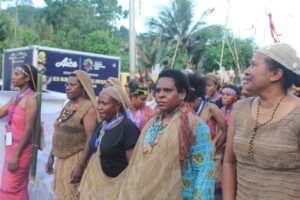
Dozens of fishing boats with colorful lights leaning on a stretch of white sand. The smell of salt pierced the nose amid the weather that began to blaze. There were two middle-aged men carrying a white box filled with fresh-sized squid. That is a cursory activity for fishermen when KONTAN visited Kedonganan Fish Landing Base (PPI), which is located not far from Jimbaran Beach, Bali, last Sunday (2/12).
Kedongan Beach is geographically included in the territory of Kedonganan Village, Kuta Selatan District, Badung Regency, Bali. Around the beach are lined seafood restaurants which are always crowded visited by local and foreign tourists. It was a common sight every day, Caucasians also hunted fresh fish at a fish market not far from the beach. This fish market is managed by the Traditional Village of Kedonganan. Practically, this area is the center of the village economy and supports the supply of fish for cafes, restaurants and hotels, to roasting stalls. Arguably, Kedonganan is a fishing village that still exists in the center of the tourism industry in Bali.
During the harvest season around July-August, PPI Kedonganan can receive 70 tons of fish per day, most of which are flying fish, lemuru, cakalang, small cob, and so on. But not all fish traded at the Kedonganan Market are caught by local fishermen. Some fish supplies must be imported from Java because of high demand. When the catch of local fishermen decreases, the price of fish crawls up because it practically relies on supplies from outside Bali. Understandably the culinary industry in Bali is growing rapidly along with the development of the tourism business. Moreover, entering the famine season, when the west wind blows hard, “Many fishermen do not go to sea, choosing to stay at home or return home,” said Khusairi, a fisherman from Madura when talking with KONTAN.
In fact, fishermen on Kedonganan Beach, on average, come from outside Bali, such as Madura, Jember, Banyuwangi, and others. Because there are not many Balinese fishermen who want to go to sea. Those who still survive prefer to rent their ships or open grilled fish stalls.
Regarding income, Khusairi said, the amount was uncertain depending on the catch. “When it’s harvest season, there are a lot. More famine, hard, a lot of debt. So you have to be smart to save, “he admitted without mentioning nominal income. Just to illustrate, Khusaeri said, revenue based on profit sharing. For example, the catch is valued at Rp. 75 million. The amount will be deducted first for fuel and logistics costs during the sea, minus the portion for the ship owner, and the percentage or share of the skipper. Well, the rest is divided for crew (ABK) with different portions according to their duties. On average in one ship there are about 25-35 ABK.
Not only fishermen, dozens of loading and unloading coolies also depend on PPI Kedonganan for their lives. One of them is Pika, from Jember. “I started farming, but I often failed to harvest. Finally, working here, there are those who invite, “he said. He claimed that his income was also uncertain. “If there are more unloading, we can get 300 thousand. If it’s quiet again, at most 50 thousand, sometimes it won’t work at all, “complained the father of two children, who had just lived a year in Bali.
Three-quarter money, the fate of fishermen in Muara Angke, Jakarta. KONTAN observations, a number of fishing boats are unloading. One by one the fish that had been frozen were removed from the hull of the ship, weighed and recorded carefully before the supervisory officer of the Muara Angke Fish Auction Site (TPI).
Ade, a fisherman from Labuan Banten, said, the life of fishermen is hard enough so they have to be skilled at saving expenses. If not, deposit for wife and children in the village drag. The crew of the Sukma Wijaya Motor Ship said, undergoing work as a fisherman has been passed down from generation to generation, and besides he has no other expertise. “If you can do anything at sea, as long as you have the will, you don’t need a diploma,” said the man who only graduated from elementary school to KONTAN, Tuesday (11/12).
Ade once questioned social programs for fishermen who were often not targeted, from direct cash assistance, health cards, to capital. “Those can be just that. The data collection must be correct, capital assistance enjoyed by only the ship owner, group leader. For ABK, this is what it is like, “he said.
Sutarjo, Motor Ship Captain (KM) Jaya residents who just finished loading and unloading at TPI Muara Angke hope, the government continues to pay attention to the condition of traditional fishermen with the increasing number of large-scale fishing vessels. The reason is, it has an impact on the catch because it has capital of simple equipment. But now, what is quite burdensome for fishermen is the cost of fuel. “It is difficult for us to get subsidized diesel fuel. There is an agent but the price is expensive. If there is no fuel, it means that you cannot go to sea and there is no income, “said a Karawang resident who has 30 crew members.
However, Sutarjo appreciated the help of a number of fishing gear such as nets from the government because it was enough to help them. All this time, KM Warga Jaya, which weighs 14 gross tonnages (GT), uses floating nets. Every two years, the jarring must be replaced. The ship operates when the moon is dark because it uses fishing lights to lure fish.
KKP’s Capture Fisheries Director General Zulficar Mochtar said, the procurement of ship aid this year was 565 units valued at Rp 42 billion. “As many as 504 ships have been completed, the rest are still being finalized. “For next year, the CTF will only distribute 300 units of ship assistance weighing under 5 GT,” he told KONTAN, Monday (10/12).
In the future, Zulficar said, his party will encourage more good management of its governance so that the value of the benefits is greater. In addition to ship assistance, the government also distributed around 9,700 units of fishing equipment free of charge to fishermen weighing less than 10 GT. So far, the use of non-environmentally friendly fishing gear such as cantrang has been concentrated in several places such as the North Coast of Java Island (Pantura), West Kalimantan and North Sumatra.
Regarding this cantrang ban, Zulficar stressed, there was no easing or relaxation. KKP appealed to fisheries players to have switched to using environmentally friendly fishing gear next year. In order to make this fishing gear transition run smoothly, KKP has taken several approaches, namely the replacement of free fishing gear for fishermen with vessels weighing less than 10 GT, encouraging access to capital through partner banks for capture fisheries weighing 10 GT-30 GT vessels, and requiring fishing gear replacement for vessels weighing more than 30 GT.
The hard struggle is also faced by fishermen in the Bangka Belitung Islands. They must fight with suction ships that mine tin sand in their catch zone. As a result of sea damage, fish catch has declined. Zulpriadi, Walhi Islands Bangka Belitung Island Advocacy (Babel) Advocacy Manager and Office, said that his party was advocating fishing conflict with mining companies operating suction vessels. At present, mining permits in the coastal areas of Babel are full. At least 56 suction vessels operate in the area.
“Mining activities at sea are a real threat to ecology, directly destroying marine ecosystems, depriving living spaces and livelihoods of pesisr and fishermen communities,” he said to KONTAN, Friday (12/14).
Walhi’s attitude, said Zulpriadi, clearly rejects the activities of sea mining. Walhi also regretted the Drafting of Regional Regulations on Coastal Areas and Small Island Islands (RZWP3K) of Bangka Belitung Islands Province to accommodate the interests of the marine mining industry more than the protection of fishermen and coastal communities. The reason is that the draft regulation still includes zoning for marine mining in West Bangka Regency; Pangkalpinang City; Bangka Regency; Central Bangka Regency; South Bangka Regency.
Supposedly, this area is zero marine mining. For this reason, Walhi together continues to oversee the making of the coastal zones and small islands. “This Zoning Perda must accommodate coastal communities and traditional fishermen not in favor of corporations that conduct sea mining and damage the environment,” he said.
Zulpriadi reminded, the zoning zestation spirit must provide protection for local communities and coastal fishermen in accordance with Law No. 1 of 2014 concerning Management of Coastal Areas and Small Islands and Law No. 7/2016 concerning Protection and Empowerment of Fishermen, Fish and Salt Farmers. In the regulation, it is clear that coastal communities and fishermen have the highest priority in managing and utilizing coastal areas and sea spaces to meet their daily needs and survival.
Author: Dadan M. Ramdan, one of the recipients of the Sea Fellow Journalist initiated by the EcoNusa Foundation
Source: https://bit.ly/2shTA3H







